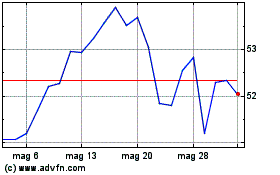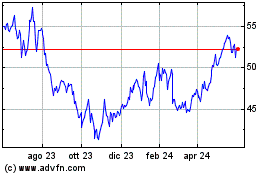Advertising company tries to address void left by sudden exit of
CEO Martin Sorrell
By Ben Dummett and Nick Kostov
This article is being republished as part of our daily
reproduction of WSJ.com articles that also appeared in the U.S.
print edition of The Wall Street Journal (April 17, 2018).
A little-known private-equity executive will steer WPP PLC
through one of its stormiest periods following the weekend
resignation of Martin Sorrell, the ad giant's high-profile founder
and chief executive.
Roberto Quarta, until Saturday WPP's chairman, has assumed the
role of executive chairman pending the appointment of a new CEO,
effectively putting him in charge of a global company struggling
with a fast-changing advertising market.
Along with two new joint-chief operating officers, he will try
to address the leadership void created by the departure of Mr.
Sorrell, who built the London-based company over 30 years and
closely managed the dozens of units that comprise the company.
Born in Italy, Mr. Quarta, 68 years old, moved with his family
as a teenager to the U.S. and helped pay to attend College of the
Holy Cross in Massachusetts by working as a security guard. Years
later, in the 1990s, his corporate cost-cutting skills would in
some circles help earn him the nickname "Bob the Knife" and "Spare
No Quarta."
WPP has said it is looking within and outside the company for a
permanent successor to Mr. Sorrell, who stepped down following an
investigation into allegations of personal misconduct.
WPP said it is treating the departure as a retirement, and the
investigation's findings are confidential. Mr. Sorrell, 73, has
denied any financial impropriety. WPP's board is scheduled to meet
Tuesday ahead of results for the first quarter. Shares were down
more than 6.5% in London on Monday.
The company named Mark Read, chief executive of WPP agency
Wunderman, and Andrew Scott, WPP's corporate development director
and chief operating officer for Europe, as the new joint-chief
operating officers for WPP. That provides Mr. Quarta with help
overseeing functions such as strategy, investments and retaining
clients.
While well-known in certain business circles in Europe, Mr.
Quarta's success as head of what is now called BBA Aviation PLC and
as an operating partner at U.S. buyout firm Clayton Dubilier &
Rice have shown him to be a no-nonsense executive focused on the
bottom line who can make tough decisions, according to people who
have worked with and for him over the years.
In the 1990s, as chief executive at BBA Group, he cut costs and
steered an effort that led to the industrial conglomerate selling
five of its seven regional divisions. The move created two global
players, including BBA Aviation, a leading operator of airport
facilities serving private aircraft. That effort won much
shareholder support as the stock surged during his tenure as CEO,
which ended in 2001.
Mr. Quarta then joined Clayton Dubilier & Rice, while
staying on at BBA as chairman until 2007. He focused on helping the
buyout firm identify industrial companies to acquire, then applying
his sector expertise to help boost revenue and profits, according
to a person familiar with the matter.
At Rexel SA, acquired by CD&R in 2005, Mr. Quarta and his
colleagues were central in helping the Paris-based distributor of
electrical products more than double its earnings during the buyout
firm's ownership, which ended in 2012, according to people familiar
with the matter.
Always immaculately turned out, Mr. Quarta pushed management to
expand faster into the growing markets of Latin America and Asia,
and pursue the next acquisition, according to former Rexel
employees.
"He's the only guy that scared the shit out of us," said one
former Rexel employee. "It was all about speed and financial
efficiency."
Mr. Quarta entered high school with limited English, and majored
in languages at college. His father worked as a tailor in
Worcester, Mass.
Today, Mr. Quarta remains CD&R's European chairman, but
isn't actively involved with any of the portfolio companies. That
provides him with more time for his responsibilities at both WPP
and British medical-device maker Smith & Nephew PLC, where he
is chairman.
Mr. Quarta is no stranger to adversity both at WPP and at Smith
& Nephew.
After joining WPP in the summer of 2015, Mr. Quarta helped to
persuade Mr. Sorrell to accept a steep pay cut, warding off a
shareholder revolt over his pay package.
Around the middle of last year, U.S. activist investor Elliot
Management Corp. took an undisclosed position in Smith &
Nephew, according to people familiar with the matter. Elliott met
with Mr. Quarta and argued for Smith & Nephew to sell assets to
boost the company's stock price. But Mr. Quarta rejected Elliott's
ideas, arguing in part that the sales would undercut Smith &
Nephew's value, according to the people familiar with the
matter.
That said, the company announced in October, a few months
earlier than planned, that CEO Olivier Bohuon would retire by the
end of the following year. Elliott declined to comment.
Now at WPP, Mr. Quarta could face a tough battle with
shareholders. Some analysts suggest that without Mr. Sorrell at the
helm, the company should be broken up.
"It's hard to see what can be done apart from some M&A
activity which monetizes some of the assets of the company," said
Alex DeGroote, a media analyst with Cenkos. "The problem isn't
replacing Martin, the problem is that the model doesn't work."
Write to Ben Dummett at ben.dummett@wsj.com and Nick Kostov at
Nick.Kostov@wsj.com
(END) Dow Jones Newswires
April 17, 2018 02:47 ET (06:47 GMT)
Copyright (c) 2018 Dow Jones & Company, Inc.
Grafico Azioni WPP (NYSE:WPP)
Storico
Da Giu 2024 a Lug 2024

Grafico Azioni WPP (NYSE:WPP)
Storico
Da Lug 2023 a Lug 2024
